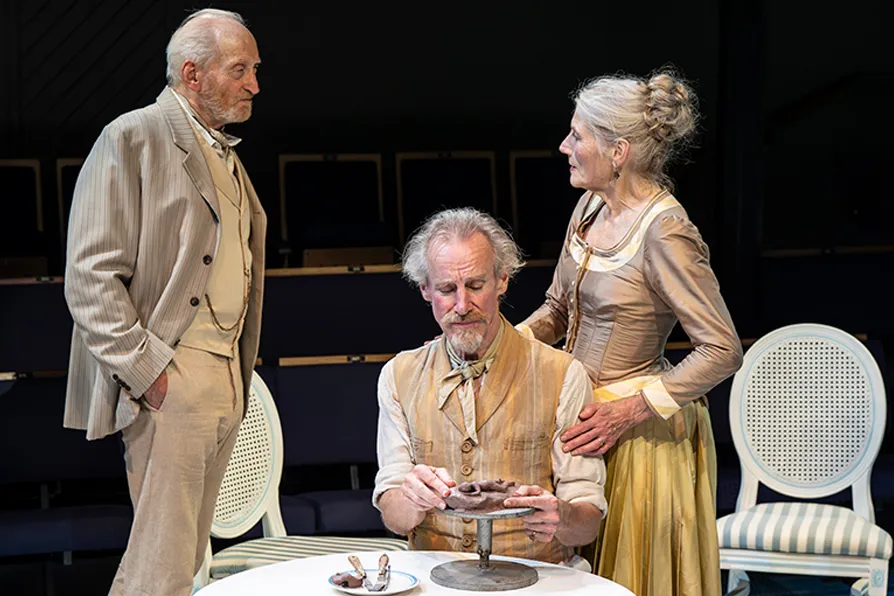RITA DI SANTO draws attention to a new film that features Ken Loach and Jeremy Corbyn, and their personal experience of media misrepresentation
Error message
An error occurred while searching, try again later.Memorable, deeply penetrating and exquisitely performed, writes MARY CONWAY

 SECOND TO NONE: (L to R) Charles Dance as Gustaf, Nicholas Farrell as Adolf and Geraldine James as Tekla / Pic: Ellie Kurttz
SECOND TO NONE: (L to R) Charles Dance as Gustaf, Nicholas Farrell as Adolf and Geraldine James as Tekla / Pic: Ellie Kurttz
Creditors
Orange Tree
⭑⭑⭑⭑☆
THE Orange Tree Richmond, under Tom Littler’s unerring direction, once again proves its worth with a top-class production of Henrik Strindberg’s Creditors.
The play — a deeply heartfelt three-hander — is interpreted for us here by a prestigious team of contemporary giants: Howard Brenton who adapts the script for this version, designer Louie Whitemore, Littler himself and of course a trio of actors second to none comprising Charles Dance, Nicholas Farrell and Geraldine James. Like so many of Littler’s offerings, this production can’t help but illuminate the theatrical year and bring professionals and punters alike pouring in.
It’s a strange, almost allegorical story. Adolf (Farrell), a painter, is married to Tekla (James) who is a fairly successful novelist. They are staying in a waterside hotel in Sweden in 1888 — or at least Adolf is in the hotel awaiting Tekla’s return from a trip away. In his troubled loneliness he befriends a charming man called Gustaf (Dance) who joins him for a friendly chat.
But Gustaf is the demon of the piece. Not only does he play on Adolf’s serious insecurities and deeply shape the man’s conscious thoughts, he also seems to engineer the epilepsy symptoms that will eventually kill him. Oh and — unknown to Adolf — he’s also Tekla’s first husband from whom she is divorced.
The play is structured around three conversations (or rather heated rants). In the first, the men seem to bond together only to unearth, in their discourse, the terrible damage that marriage can cause and the sly machinations, profound untrustworthiness and soul-sucking ardour of women. It is here that Gustaf wreaks his revenge on Adolf and where we begin to understand the meaning of the play’s title. For Gustaf is the creditor come to call. And Adolf is his bankrupt target.
The second section charts the arrival of Tekla — all flirtatious prettiness but concealing a controlling zeal — to be greeted by a now strangely challenging Adolf. Meanwhile, the final third sees Gustav playing seductively with Tekla and revelling in his demonic victory over Adolf.
Strindberg tore this play from the entrails of his own traumatic marriage, and it’s an exposition of his own inner torment at the age of 39. Interestingly, Littler and Brenton have chosen to cast all three characters as much older than intended in the original. But this adds dimension, and it’s a privilege to watch all three actors performing with such effortless brilliance and at such close quarters.
This work was originally way ahead of its time. And the intricacies of the mind revealed by the two men, as they explore their misogynistic tendencies and their terror of a wife’s infidelity, are still fresh and meaningful, the detail that Adolf and Tekla “gave away” their newborn son rendered especially shocking by its casual mention.
But for a modern audience the play gets somehow stuck in a groove of repeated argument that leaves the characters un-progressed and the ending contrived. Consequently, despite profound themes, we are never wholly moved.
Memorable though. Deeply penetrating. And exquisitely performed.
Runs until October 11, Box office 020 8940 3633 or https://orangetreetheatre.co.uk










